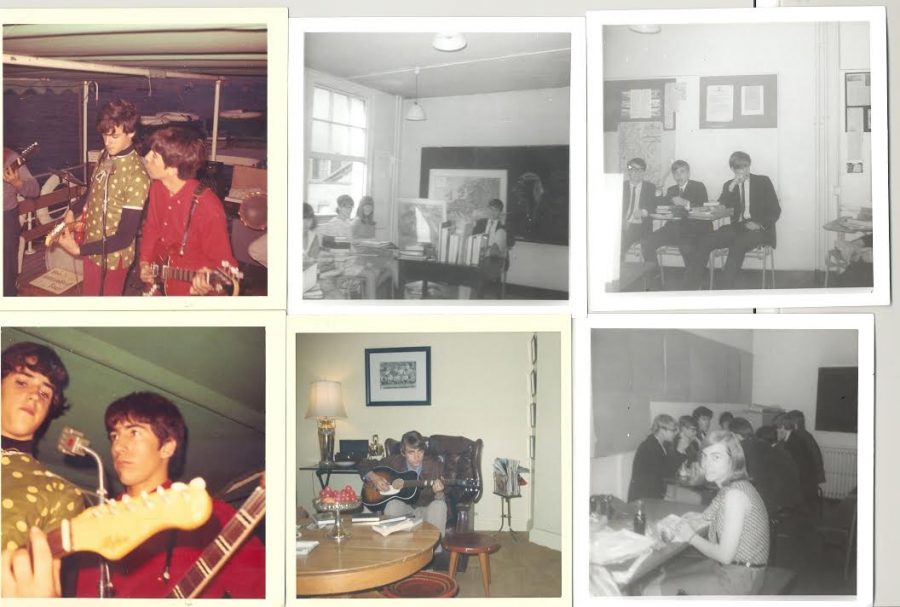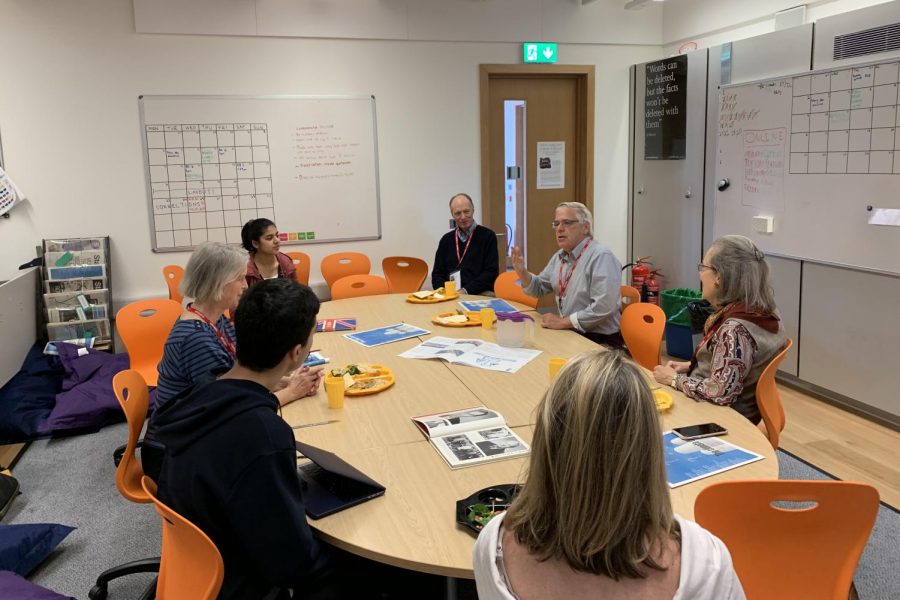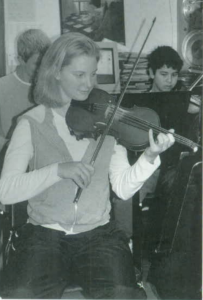In 1969, ASL wasn’t at Waverley Place. Rather, the school was situated in two townhouses just down the road from Camden Town tube station.
Sitting down for lunch with Jim Luedke (’69), Linda Tucker (’69) and Libby Eustis (’69), I got to hear about the experiences of being a student at that ASL, 50 years ago. Luedke began the conversation by jokingly saying that compared to the current ASL at Waverley, the old campus was just “two town houses crumbling inside.”
Eustis concurred, saying that all teaching then was done in “simple rooms with blackboards” and in the basement there were labs with tools such as microscopes.
“That was about all the equipment we had,” she said.
There was no security at the school, and students travelled freely between the two houses, which made up the middle school and high school.
“There was no such thing [as security], and no need for it,” Eustis said.
For the three alums, the teaching and social scene is what made ASL memorable. Paul Morton was one teacher specifically mentioned as being an inspiration for the High School student body.
“The teaching was excellent,” Tucker said.
On a day to day basis, lunch at the school consisted of a “cup of soup for six pence” Luedke said, opposed to the numerous hot and cold food options students have today.
The three alums agreed that living in London during the 1960s was eventful as an American. Tucker recalled the school receiving bouquets of flowers when former President John F. Kennedy was assassinated in 1963.
Luedke interjected. “You’re not going to meet many ASL who were here November of ’63 when JFK died,” he said. “That’s incredible.”
Tucker and Eustis were also enrolled at ASL when the U.S. landed men on the moon. They spoke about this with a particular humor and fondness.
“People were walking up to us and congratulating us as if we were personally involved,” Eustis said.
Tucker also said she remembered witnessing Winston Churchill’s funeral.
“I remember him lying in state, I saw him at the palace in Westminster, and his funeral and the tolling of the bells,” she said.
Living as an expat in London in the 1960s offered an interesting cultural experience for the alumni. The rise of Rock’n’Roll was popular among the students at ASL, and Tucker said she remembers her friends casually seeing world famous bands.
“When we were here … I had a friend who was hanging out at clubs and people like The Who played before they were huge,” she said.
Luedke also said she remembers the reign of Jimi Hendrix, and how his popularity soared amongst the High School.
For Tucker, the social scene at the school didn’t contain anyone feeling “left out,” but there definitely were the “innies” of the High School who made up a popular group.
She remembers a place called the Tea House in Camden where the “in-crowd” would hang out, smoke cigarettes, and eat fish and chips.
She said students also enjoyed the liberty of living in the U.K.
“You could drink legally at a pretty early age, and I don’t think anyone was checking,” she said.

Jim Luedke (’69), pictured in the front-right, makes a face at the camera. This photo was taken during his middle school years at ASL.
The alumni engaged with British culture, but also began to see the growth of their American culture in London.
“We were here when the first good hamburger spot opened up in London,” Eustis said. “The great American disaster opened a wonderful hamburger restaurant.”
Tucker recalled memories of her mother baking U.S. sweets for her British friends at church.
“I personally think my mother introduced the brownie and the chocolate chip cookie to the U.K.,” Tucker said. “They were dying, they loved it. Beverley, my mother, would bring them as her presents because, of course, we were dying for minced tarts and pigs in a blanket and lemon curd tarts, but they loved that.”
Tucker and Eustis also remembered the sense of independence they felt as teenagers living in London. Tucker recalled riding bicycles into Covent Garden with her friends on weekday mornings for fun.
“We were looked at with great confusion … ‘these American girls’ … but it was just an adventure,” she said. “I had a sense of terrific freedom.”
“I personally think my mother introduced the brownie and the chocolate chip cookie to the U.K. The British were dying, they loved it. Beverley, my mother, would bring them as her presents [to social events] because, of course, we were dying for minced tarts and pigs in a blanket and lemon curd tarts, but they loved that.”
— Linda Tucker ('69)
One of Luedke’s most vivid memories of London in the 60s was the presence of steam engine locomotives, which were in use until 1967.
“Walking to school everyday from Camden Town, I went over that bridge, and the steam engines go under the bridge,” he said. “I can still smell that steam.”
Tucker agreed, describing London as a “dirty city.”
“We might’ve been in London for the last true–they called it fog, it wasn’t fog, it was smog,” she said.
Trains, however, also offered opportunity for fun. Luedke recalled trainspotting as a young boy commuting in from Surrey to go to school.
“One of my big hobbies was transporting.”
In the 1960’s, the alums described how students lived all over, and not just in the city. There was an influx of American citizens, but not necessarily a centralized hub as St John’s Wood is today. Luedke said that lots of “Oil” families from Houston, as mentioned in Beginnings of ASL, were moving to the U.K.. His own father moved for work at an oil refinery.
“He had a modest career, he was an engineer,” he said. “He worked on a big plant, oil refinery, and was transferred to the London office.”
Tucker moved from Oklahoma, which she described as a major change of environment, yet one that was doable.
“It was a big hop, but I was young enough,” she said.
Her father, Paul Tucker was a member of Phillips Petroleum company, and he actually attended the groundbreaking of the campus at Waverley in 1969.
Eustis moved for her father’s work as well, and the three noted that this trend reflected a larger picture of the workforce at the time.
“You know we talk about our dads because in the 1960’s,” she said. “Almost all the mothers were at home.”
The three alums also participated in student activism, and remained in tune with what was happening in the U.S.
“We were here for the upsets in 1968 and a lot of protests against the Vietnam war, which we participated in,” Eustis said.
Fifty years on from graduation, staying in touch is important for the three alums. Eustis explained how back then, there was minimal correspondence between high school students after they left the school.
“In those days, the school paid absolutely no attention to alums,” she said. “For people who don’t have deep roots in one place, it makes a difference to keep in touch with each other… unless you were a real letter writer, then, there was a tendency to lose touch.”
The alums touched on a sentiment often felt nowadays at ASL as well: where home is. Eustis said that when she returned to the states for college in 1969, she missed England. This actually caused her to move back for two years.
“I felt kind of mid Atlantic, and could get really pulled by missing one side or the other, whichever side I wasn’t on, you get homesick for whichever one you’re not in,” she said.
Eustis expressed appreciation for their class president, Jerry Post, who actually began putting the class “back together” by scheduling reunions.

Photos taken from ASL yearbooks in the 1960’s.
There is a sweet feeling of coming back to London for the trio. Luedke noted how this is first time back in 41 years.
Echoing Luedke, Tucker expressed a sense of discovery and joy when coming back.
“When I came back to London, I remember thinking like, ‘oh, this is where my sense of humour came from,’ and things that were formative,” she said.
Currently, the alumni are heading to Houston for another reunion. 50 years and counting, the class of ’69 view their experience in good light and marvel at the place ASL has become.









